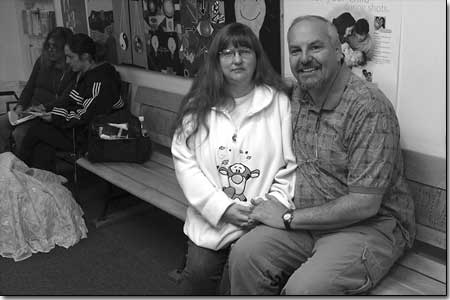|
Planned expansion copes with foster parent shortage
by Colleen Valles
 |
| Ken and Gayle Puhler have three
foster children at home, one of which will become a permanent
part of the family once the adoption of the 3-year-old is
complete. Despite couples like the Puhlers,La Plata County
is seeing a shortage of foster families./Photo by Todd Newcomer. |
La Plata County has big plans for foster care: It’s starting
up a program that will provide foster families for children with
mental health or behavioral issues. With the closure of nearby
mental health facilities for children, county workers are aiming
to keep foster kids in La Plata County, near their families, schools
and friends. There’s just one problem – there are
not enough foster parents in the county to provide the stable
environment these children need.
“We don’t have any (foster parents) on reserve,”
said Sheri Ramsey, foster care coordinator and adoption specialist
at the county’s Human Services Department. “The need
is pretty high.”
There are 15 certified foster families in La Plata County and
22 children in foster placement. Ramsey noted that finding qualified
foster families is a difficult task.
“Every time we have to make a placement, we have to struggle
to find one,” she said.
In addition, some foster parents have recently retired, according
to Carson Jones, treatment foster dare coordinator with the county.
As further evidence of the shortage, families in Archuleta County
are certified to be foster parents for La Plata County children.
But the fact remains that La Plata County needs more local foster
parents.
“Our big issue is we don’t want to send kids out
of the county,” Jones said.
County workers try to find compatible placements for the children.
Often, if a foster family has children of its own, Ramsey said
they will try to place a child in need with a family whose children
are older than the child being placed.
Experience is also a factor. Foster families who have been at
it for a while or who have dealt successfully with difficult children
can be employed to house kids with more severe problems.
 |
For the treatment homes, if
there are
Sheri Ramsey, La Plata County’s foster care coordinator,
works at her desk Tuesday afternoon at the county courthouse.
According to Ramsey, there are 15 certified foster families
in La Plata County and 22 children in foster placement, thus
making the task of finding qualified foster families difficult./Photo
by Todd Newcomer. |
For children with mental health or behavioral problems, the county
is working on a program called TLC – Treasuring Local Children.
In this program, foster parents would be trained to deal specifically
with children with behavioral and mental health problems. In these
so-called treatment homes, the foster parents’ role would
be more intense than in a regular placement.
“We desperately need treatment foster homes,” Jones
said. “Treatment foster care is such a need for so many.”
Jones said the county is hoping to certify four homes locally
in the treatment program, but foster families in general are needed.
“Our homes are filling up,” she said.
Jones said when children need to be placed in foster care, others
in their families are first considered as possible guardians,
but many times the family itself is not a healthy place for the
kids to be.
Children with the worst problems, those who are suicidal or homicidal,
can sometimes get placed in acute care homes. Southwest Mental
Health works one-on-one with those families to make sure the children
get good care.
What puts children in need of foster care varies from case to
case, but parental drug abuse plays a big role in the area.
“In La Plata County, there is serious alcohol and drug
abuse, and there’s the emotional and physical neglect that
comes with that,” Jones said. “Helping those parents
get over addiction and maintain sobriety is very hard.”
For some parents, it doesn’t happen. That’s when
the kids can go from being foster children to going up for adoption.
The court is responsible for terminating parental rights. For
a child under 6, birth parents who are on drugs or alcohol have
one year to get to the point where they can parent the child themselves.
If, after that year, they are unable to fulfill their parental
duties, the county is, by law, required to petition the court
to terminate their parental rights, Ramsey said. Then it’s
up to a judge to decide what to do. For children over 6 years
old, parents have 18 months to get themselves together.
Ramsey said there’s not an average length of time that
kids stay with their foster families; it varies from child to
child. But, she said, “it seems like lately they’ve
been staying longer and that more kids are going to adoption than
there were in the past.”
To become certified as a foster parent, Ramsey said a person
needs to go through 47 hours of training the first year and 20
hours a year each year after that. The county requires first aid
and CPR certification, health evaluations and does home assessments,
interviewing everyone in the house – parents and children.
A candidate must also fill out an autobiographical questionnaire.
Once a family gets certified, the county provides support such
as a foster parent group that meets once a week to discuss issues
they are facing.
Children in placement are on Medicare or private insurance to
pay their medical bills, and the county pays a stipend to the
family to cover the cost of care. For the treatment homes, if
there are no children placed in a home, the county will pay a
retainer fee to keep that home as a treatment home for the future,
Jones said.
Ken and Gayle Puhler have been foster parents for 12 years and
now are becoming adoptive parents. They are in the process of
adopting one of their foster children – a 3-year-old who
has been living with them for two years.
The couple already has raised two children – a 26-year-old
son and a 22-year-old daughter. And over the years, they have
helped out 129 foster children.
“It’s nice when you can see healing and growth in
the kids and know you can provide a safe place for these kids
to stay before they can go back to mom,” Ken Puhler said.
But the biggest reward, he said, is seeing the children get reunited
with their families.
“It’s a lot of work, but it’s a lot of fun,”
he said. “It provides a really needed service to the kids,
these families and the community.”
|

